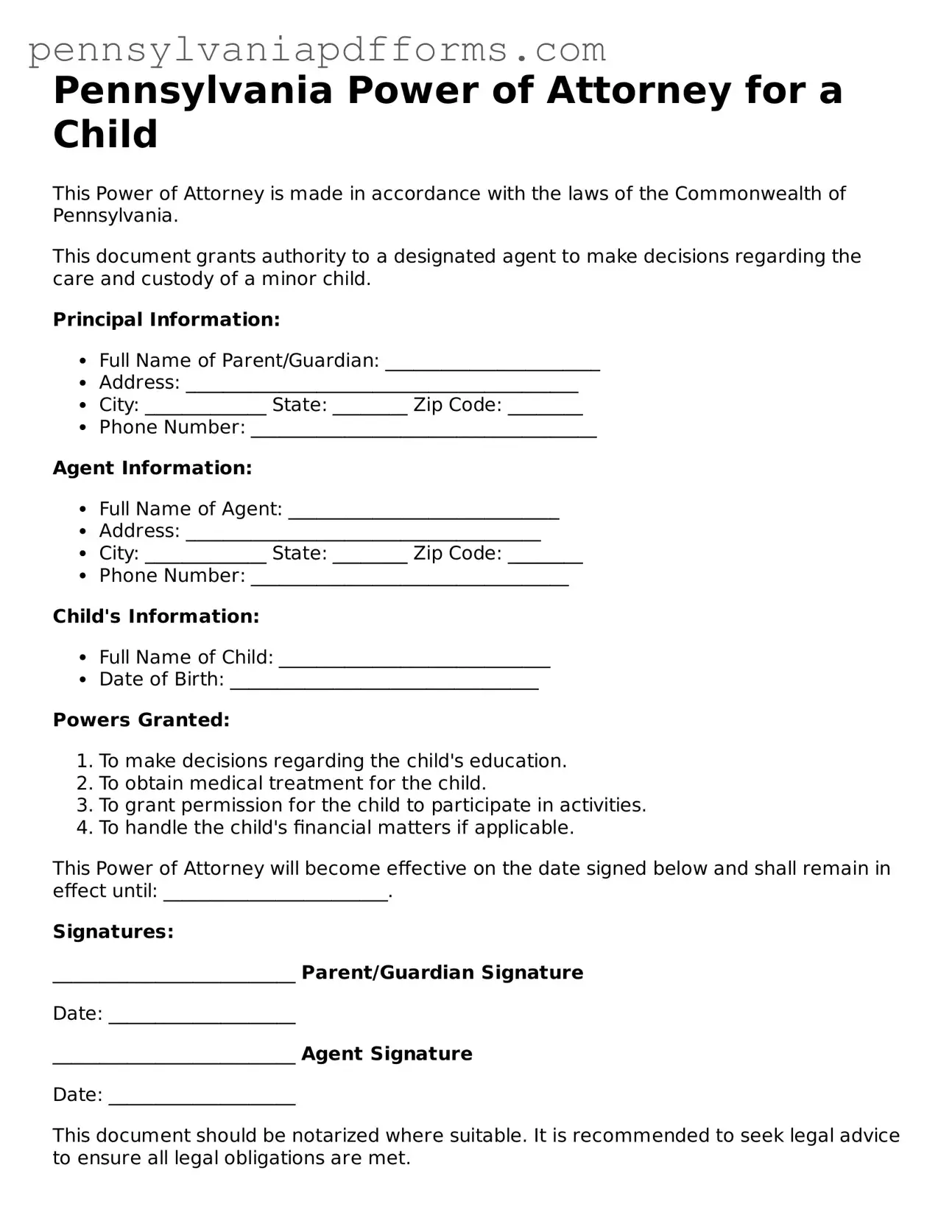The Pennsylvania Power of Attorney for a Child form is similar to the general Power of Attorney (POA) document. A general POA allows one person to act on behalf of another in various legal and financial matters. Just as the Power of Attorney for a Child grants authority over a child's care and decisions, a general POA can empower someone to handle a wide range of responsibilities, such as managing finances or making healthcare decisions. Both documents require the principal's consent and are designed to ensure that the appointed agent can act effectively in the best interest of the individual they represent.
Another document that shares similarities is the Medical Power of Attorney. This form specifically grants someone the authority to make medical decisions on behalf of another person if they become incapacitated. Like the Power of Attorney for a Child, it emphasizes the importance of having a trusted individual in charge of critical decisions. In both cases, the individual granting the authority must be clear about their wishes and the level of decision-making power they are comfortable relinquishing.
The Guardianship Agreement is also comparable. This legal arrangement appoints someone to care for a minor or an incapacitated adult. While a Power of Attorney for a Child can be temporary and is often used for specific situations, a guardianship is typically more permanent and requires court approval. Both documents aim to ensure that the best interests of the child or individual are prioritized, but guardianship involves a more formal legal process.
The Child Custody Agreement is another related document. This agreement outlines the terms of custody arrangements between parents or guardians regarding a child's upbringing. Similar to the Power of Attorney for a Child, it focuses on the child's welfare and outlines responsibilities. However, custody agreements are generally more focused on parenting rights and responsibilities, while the Power of Attorney is about delegation of authority for specific decisions.
The Temporary Custody Agreement is akin to the Power of Attorney for a Child in that it allows a designated person to care for a child for a limited period. This can be particularly useful in emergencies or when parents are temporarily unable to care for their child. Both documents serve to ensure that a child’s needs are met, but a Temporary Custody Agreement usually has a set expiration date, while a Power of Attorney can remain in effect until revoked.
The Adoption Agreement shares some similarities as well. This legal document formalizes the process of adopting a child, transferring parental rights from one party to another. While the Power of Attorney for a Child is about temporary delegation of authority, adoption is a permanent change in a child's legal status. Both documents aim to protect the child's interests and ensure they are cared for, but adoption involves a more comprehensive legal process.
The Family Care Agreement can also be compared to the Power of Attorney for a Child. This document outlines the responsibilities and expectations of family members who are caring for a child. Like the Power of Attorney, it emphasizes the importance of clear communication and understanding among caregivers. However, a Family Care Agreement is often less formal and may not carry the same legal weight as a Power of Attorney.
In understanding the various legal documents related to childcare, it's essential to consider the many options available to parents and guardians. One such important document is the Ohio Lease Agreement form, which highlights how written agreements can beneficially define roles and responsibilities. For more information on lease agreements and templates, you can refer to PDF Document Service, a useful resource for landlords and tenants alike in managing their agreements effectively.
Lastly, the Special Needs Trust is relevant to this discussion. While it primarily focuses on managing financial resources for a child with special needs, it often works in conjunction with a Power of Attorney for a Child. Both documents aim to ensure that the child's needs are met, but a Special Needs Trust specifically addresses financial management and protection of benefits, whereas the Power of Attorney is more about decision-making authority.

